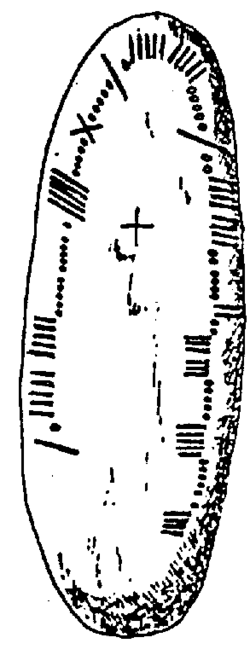Ballintaggart Ogham Stones
Appearance
| Ballintaggart Ogham Stones | |
|---|---|
| Native name Clocha Oghaim Bhaile an tSagairt (Irish) | |
 CIIC 156, bearing the name of the Corcu Duibne | |
| Type | ogham stones |
| Location | Ballintaggart, Dingle, County Kerry, Ireland |
| Coordinates | 52°07′40″N 10°14′35″W / 52.127810°N 10.243167°W |
| Elevation | 51 m (167 ft) |
| Built | AD 400–550[1] |
| Owner | private |
| Official name | Ballintaggart |
| Reference no. | 64[2] |
Ballintaggart Ogham Stones is a collection of ogham stones forming a National Monument located in County Kerry, Ireland.[3][4][5]
Location
[edit]Ballintaggart Ogham Stones are located inside a round enclosure (diameter 30 m / 100 ft), immediately east of Dingle racecourse and southeast of the town.[6][7][8]
History
[edit]The stones were carved in the 5th and 6th centuries AD and served as burial markers.[9]
This was anciently the site of a church and old burial ground (An Cheallúnach or An Lisín).[10][11][12][13]
Description
[edit]The ogham stones are rounded, made of water-rolled sandstone. Eight of them form a circle, each one lying down pointing outwards. The ninth lies at the centre. Several have been inscribed with crosses.
- CIIC 155: AKEVRITTI (presumably a personal name)
- CIIC 156: MAQQI-IARI KOỊ MA/QQI MU/CCOI DOVVINIAS (Here is Mac-Iair, son of the Corcu Duibne)
- CIIC 157: DOVETI MAQQI/ CATTI/NI (of Duibthe, son of Caitne). The language used here is primitive, lacking vowel affection, placing it around the time of Saint Patrick
- CIIC 158: SUVALLOS MAQ/Q̣Ị DU/COVAROS (of Suvallos son of Ducovaros)
- CIIC 159: ṂẠQI-DECC[E]DẠ/ ṂẠQ̣Ị/ GLASICONAS (of son of Deichet, son of Glasiconas). The personal name Glasiconas means "grey wolf."
- CIIC 160: TRIA MAQA MAILAGNI (of the three sons of Maílagnas) / CURCITTI (of Cuircthe). This stone bears a strange cross: with arms of equal length, two with "E" shapes on the end, one with a "Y" and one with a +[14]
- CIIC 161: INISSIO/NAS (a personal name); like CIIC 157 it dates to the 5th century AD
- CIIC 162: CUṆẠMAQQ̣I/ AVI CỌRBBI (of Conmac, grandson of Corb)
- CIIC 163: N[E]TTA-LAMINACCA KO/I ṂA/QQI MỤCOI DOṾ[I]Ṇ[IA]Ṣ (here is Laminacca's champion, son of the Corcu Duibne)[15][16]
References
[edit]- ^ Monk, Michael A.; Sheehan, John (1 January 1998). Early Medieval Munster: Archaeology, History and Society. Cork University Press. ISBN 9781859181072 – via Google Books.
- ^ "National Monuments of County Kerry in State Care" (PDF). heritageireland.ie. National Monument Service. p. 1. Retrieved 30 November 2022.
- ^ Macalister, Robert Alexander Stewart (1 January 1902). "Studies in Irish Epigraphy: The Ogham inscriptions of the counties of Kerry (not included in part I), Limerick, Cavan, and King's". D. Nutt – via Google Books.
- ^ Bonser, Wilfrid (1 January 1957). "An Anglo-Saxon and Celtic Bibliography (450-1087)". University of California Press – via Google Books.
- ^ Ferguson, Sir Samuel (1 January 1887). Ogham Inscriptions in Ireland, Wales, and Scotland. D. Douglas – via Internet Archive.
Ballintaggart ogham.
- ^ "Ballintaggart Ogham Stones".
- ^ "Ballintaggart Ogham Stones". 8 September 2010.
- ^ King, Jeremiah (1 January 1986). County Kerry past and present: a handbook to the local and family history of the county. Mercier Press. ISBN 9780853427988 – via Google Books.
- ^ Peritia. Medieval Academy of Ireland. 1 January 2008. ISBN 9782503517643 – via Google Books.
- ^ The Megalithic Portal and Megalith. "Ballintaggart Nine Stones".
- ^ Crowl, Philip Axtell (1 January 1990). The Intelligent Traveller's Guide to Historic Ireland. Contemporary Books. ISBN 9780809240623 – via Google.
- ^ "Drumlohan Ogham Stones/Megalithic Monuments of Ireland".
- ^ Schorr, Frank. "Ballintaggart Ogham Stones".
- ^ "Ballintaggart Ogham Stones/Megalithic Monuments of Ireland".
- ^ "Ogham in 3D - Ballintaggart / 155. Ballintaggart I".
- ^ Macalister, Robert Alexander Stewart (1 January 1907). "Studies in Irish Epigraphy: Ogham inscriptions of the counties of Cork, Tipperary, and Waterford". D. Nutt – via Google Books.
Wikimedia Commons has media related to Ballintaggart Ogham Stones.

